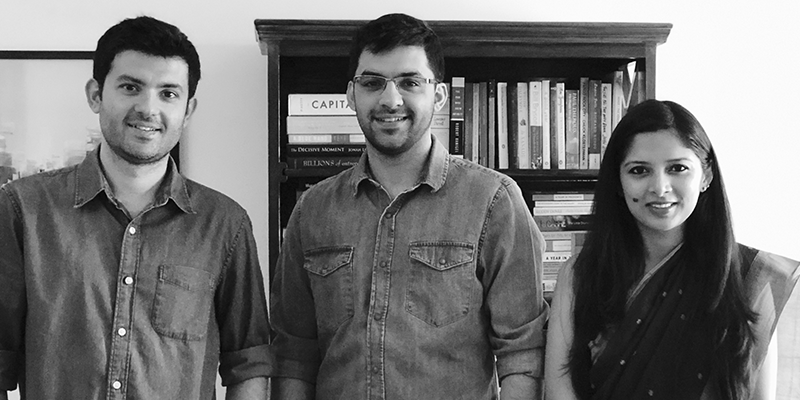Tilfi founders fold a business abroad, return to their roots to weave success
Banaras-based luxury ecommerce firm gives consumers direct access to Banaras handloom and caters mostly to the Indian diaspora based in Australia, Singapore, and the US.
At a glance:
Startup: Tilfi
Founders: Udit Khanna, Aditi Khanna, Ujjwal Khanna
Where it is based: Banaras
Founded in: 2016
Sector: Luxury ecommerce
The problem it solves: Reviving and boosting handloom
Funding: Bootstrapped
As the weaver lamented over his sons' unwillingness to follow in his footsteps, three young people gave him ideas on how he could motivate them to pursue their ‘hunar’. The old man, in turn, queried why the trio chose to not join their father and grandfather’s trade. A moment’s self-reflection made the inherent hypocrisy clear.
The big question in Udit Khanna, his wife Aditi Khanna and his brother Ujjwal Khanna's minds was, "How could we hope to preserve and further this beautiful art and persuade others to join the trade, if we wouldn’t do it ourselves?"
Questions gave way to answers and answers to an action plan.
Udit recollects, “This time we discussed moving back to Banaras. We saw tremendous potential in the craft and also felt a sense of responsibility towards it. Our outlook was not limited to help Banarasi handloom survival, but we wanted it to thrive and resonate across the world.”
Their labour of love, Tilfi, is a luxury handloom brand that derives eponymously from a type of Banarasi weaving, where three meenakari yarns run continuously without a break.

“Tilfi invests in the riches of Banaras’ past, in the present, to give our exquisite handcrafts a future," says Udit, pointing out that all their weaving is in Banaras and its surrounding areas. Made with all natural fabrics, everything at Tilfi is hand woven.
Launched in October 2016, Tilfi mostly caters to the Indian diaspora in Australia, Singapore, and the US. While they have customers in Europe as well, their most unexpected order was from the Island of Réunion.
Giving direct access to consumers to Banaras handloom, and to help and revive the weaving community, the trio wants to push for innovation not only in patterns, but also in techniques, to ensure that it adapts and thrives.
A life-changing conversation
Udit and Ujjwal come from a family steeped into the handloom spun business in Banaras for several decades, surrounded by weaves and weavers for as far back as they can remember. “Back in 2013, my family’s wholesale saree business was on the verge of being wound up. My father had semi-retired, and had taken on a separate passion project in construction,” says Udit.
After completing his studies in Delhi, Udit was living in the UK with his wife Aditi, and was running a successful business there. Banaras was not on the cards then. But the conversation with a weaver in the winter of 2013 shifted his perspective and changed their life.
Aditi, 32, and Udit, 33, both Mathematics graduates from St. Stephens's College in Delhi, got married in 2012. The very next year, they sold their business in the UK and decided to pursue an MBA to gain skills to build a global brand and also use the time to think through their plans. In 2015, they joined INSEAD, and the next year they started up along with Ujjawal.
Bridging the gap
A vast majority of Tilfi’s sales are online through its website, and the rest are through the physical store in Chowk, Banaras - the hub of Banarasi textiles. “We have operated out of this premises for more than 50 years now. All our products are housed here,” reveals Udit.
Though they haven’t physically revamped the store, they have built out a new team for quality control, packaging, dispatch and inventory management, etc. Last year, they opened an office in Delhi for designing and handling website operations.
“We have launched a stitched apparel unit in Delhi earlier this year, where we make garments that only use pure and handwoven fabrics from Banaras. With this venture, we hope to continue pushing the envelope, redefine consumer perceptions of our traditional textiles, and increase its appeal to a wider consumer base.”
The Team
Tilfi has a pool of 2,000 weavers in and around Banaras and there are hundreds of craftsmen who take care of different aspects such as dyeing, graphing, card-cutting etc. “Some weave exclusively for us, while others work with us on a few designs that we commission. Some have worked with us for generations, and some have only started recently. It is our endeavour to build sustained relationships with all our weavers,” says Udit.
According to him, it takes skills developed over generations and the effort of multiple participants in the handloom value chain to make the kind of garments they do. It takes almost two weeks to weave a dupatta, one of their primary products, while the designing, graphing, card cutting, and preparing a yarn to weave a saree may take anywhere between two weeks to a year.

By commissioning their designs to weavers, Tilfi assures them a good business and pay. Given that the gestation period for new products is long, they can’t just ramp up production even if a product does really well. They also engage women from weaving families in various aspects of the business - from warp preparation to tasselling.
Aditi, who previously worked as an investment banker with Edelweiss, is the brain behind Tilfi, while Ujjwal, 24, is the creative force. A business graduate from Narsee Monjee, Mumbai, he is handson with the weavers to ensure that Tilfi produces the finest handlooms. They also have a 20-member design and operations team based out of Delhi.
Building a steady stream of consumers
The handloom industry is the second-largest employment provider for the rural population in India after agriculture, with over more than 4.3 million people directly involved in the production. An Assocham report shows that India's luxury handloom market is set to grow to $30 billion by year-end, and has already reached a revenue total of $23.8 billion.
As a luxury brand, Tilfi’s order value is much higher than most other ecommerce websites. With over Rs 25,000 as their average order value, they have 62 percent of orders coming from repeat customers. They have 33 percent of their customers ordering online multiple times. Udit claims they have doubled their revenue from last year, but did not reveal the numbers.
With high-ticket items, their primary challenge is to have customers buy luxury products without draping or feeling it. To this end, good product photography and detailed descriptions have helped them convince their customers to make informed purchases online. “Many of our current customers started by purchasing lower priced items such as dupattas first, and later went on to make bigger purchases.”

Most of their customers come via word of mouth, but they do occasionally participate in exhibitions and hold private events too. “By selling online, we are able to quickly gauge customer response and with control over the production process and proximity to our weavers, we can take on greater risks with new product development. We are thus able to push the boundaries of our craft.”
Broadly speaking, their competitors are ethnic Indian fashion portals or handloom-focused brands such as Jaypore, Aza, Carma, Raw Mango, and Ekaya, including other stand-alone luxury and designer brands, especially those focused on Banarasi handloom.
Udit’s take is that most of Tilfi’s peers act as catalysts in the resurgent handloom industry. “They help in expanding the scale and scope our textile arts. They also help in promoting the cause of handloom and increasing the market size for Banarasi crafts. As we develop Tilfi into a lifestyle brand, we also see our competition evolving.” However, there are some things that sets Tilfi apart, and he is quick to point that:
Being a Banaras-based company gives us great control over our craft and production. This is a distinct advantage over other marketplaces who stand to be disintermediated over time. It also makes our brand more authentic in its appeal.
Marching forward
Upbeat about their future, Udit reveals, “We are also looking to expand into associated product categories in the luxury and lifestyle segment, and next year, we also plan to launch an ultra-premium line of exclusive and customised offerings by employing rare weaving techniques.”
In the coming years, they plan to have their first flagship store ready and grow their apparel line with the textiles being produced by them, and expand it as a full-fledged product offering catering to a more international audience.
Starting something they never envisaged to do many years ago, the trio has embraced their roots and the weaver community to make Banarasi handloom shine on the international circuit.











